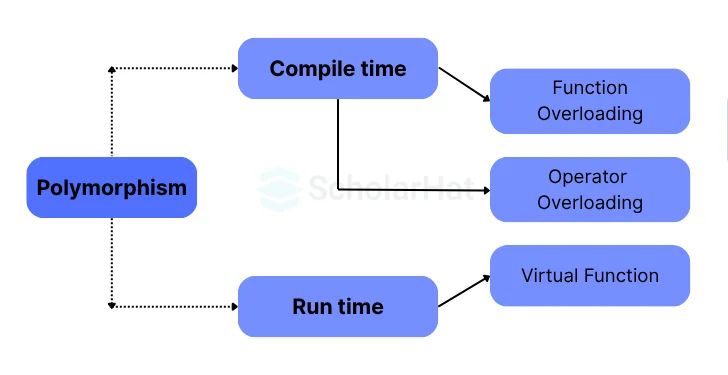06
FebPolymorphism in Java: Definition, Types, and Real-Life Examples
In this Java Tutorial, we will explore polymorphism in Java, including the different types of polymorphism and the difference between method overriding and method overloading. Core Java skills can unlock ₹8 LPA jobs. Don’t wait. Enroll now in our Free Java Course and start your success story!
Read More: Best Java Developer Roadmap
What is Polymorphism in Java?
Polymorphism is a key feature of Java and one of the core pillars of Object-Oriented Programming (OOP). It allows a single entity—such as a method or constructor—to take multiple forms, enabling more flexible and reusable code. Common examples include method overloading and constructor overloading, which are forms of compile-time polymorphism. Additionally, Java's conditional statements can help developers control how polymorphic behavior is applied during execution, making code more dynamic and adaptable.
Polymorphism in Java Example
Example 1:
This example shows how different shapes (Circle and Rectangle) can share a common interface (`Shape`) and override the `draw` method to exhibit their own behavior.
// Base class
class Shape {
void draw() {
System.out.println("Drawing a Shape");
}
}
// Derived class 1
class Circle extends Shape {
@Override
void draw() {
System.out.println("Drawing a Circle");
}
}
// Derived class 2
class Rectangle extends Shape {
@Override
void draw() {
System.out.println("Drawing a Rectangle");
}
}
// Main class
public class PolymorphismExample1 {
public static void main(String[] args) {
Shape shape1 = new Circle();
Shape shape2 = new Rectangle();
shape1.draw(); // Calls Circle's draw() method
shape2.draw(); // Calls Rectangle's draw() method
}
}
Output:
Drawing a Circle
Drawing a Rectangle
Example 2:
In this example, the `Calculator` class demonstrates polymorphism through method overloading to calculate the area of different shapes.
// Class with overloaded methods
class Calculator {
// Calculate area of a rectangle
double calculateArea(double length, double width) {
return length * width;
}
// Calculate area of a circle
double calculateArea(double radius) {
return Math.PI * radius * radius;
}
}
// Main class
public class PolymorphismExample2 {
public static void main(String[] args) {
Calculator calc = new Calculator();
double rectangleArea = calc.calculateArea(5.0, 3.0);
double circleArea = calc.calculateArea(4.0);
System.out.println("Area of Rectangle: " + rectangleArea);
System.out.println("Area of Circle: " + circleArea);
}
}
Output:
Area of Rectangle: 15.0
Area of Circle: 50.26548245743669
Different Types of Polymorphism in Java
There are two types of Polymorphism in Java, which are:
- Compile time Polymorphism in Java
- Run time Polymorphism in Java

Read More - Advanced Java Interview Questions
Compile time Polymorphism in Java
Compile-time polymorphism in Java, also known as static binding, is achieved through method overloading and constructor overloading. It allows the compiler to resolve method calls at compile time, enabling Java programs to handle different types of inputs with the same method name.
1. Method Overloading in Java
Method overloading in Java works for two or more methods or functions stored in the same class with the same name but different parameters and arguments.
Example of Method Overloading in Java
class Method_Overloading
{
//Method Overloading by changing the number of arguments (or parameters)
//Method 1
double figure(double l, double b) //two arguments or parameters
{
return (l*b);
}
double figure(double s) //one argument or parameter
{
return (s*s);
}
//Method 2
public static void main(String[] args)
{
Method_Overloading obj = new Method_Overloading();
System.out.println("Area of Rectangle: " +obj.figure(5.55, 6.78));
System.out.println("Area of Square: " +obj.figure(3.45));
}
}
Output
Area of Rectangle: 37.629
Area of Square: 11.90250000000002
2. Constructor Overloading in Java
Constructor overloading in Java when more than one constructor is declared inside a class but with different parameters. If an object in a class is created by using a new keyword, it generates a constructor in that class. In this Guide to Java, we'll explore how constructor overloading works through illustration in Java Online Editor and its significance in object-oriented programming.
Example of Constructor Overloading in Java
public class ScholarHat {
// function for adding two integers
void add(int a, int b) {
int sum = a + b;
System.out.println("Addition of two integers: " + sum);
}
// function for concatenating two strings
void add(String s1, String s2) {
String con_str = s1 + s2;
System.out.println("Concatenated strings: " + con_str);
}
public static void main(String args[]) {
ScholarHat obj = new ScholarHat();
// addition of two numbers
obj.add(10, 10);
// concatenation of two strings
obj.add("Operator ", "overloading ");
}
}
Output
Addition of two integer :20
Concatenated strings :Operator overloadingFor learning more, refer to Constructor Overloading in Java
Subtypes of Compile-time Polymorphism
Runtime Polymorphism in Java
Runtime Polymorphism specifies the depiction of run time by using overriding.
1. Method Overriding in Java
This particular Java method redefines a superclass method by generating the same name, parameters, and data types in a subclass.
Example of Method Overriding in Java
//A Simple made up Instance to show method overriding in Java
class Waka_Waka_Song
{
Waka_Waka_Song()
{
System.out.println("Song--Initializing Waka Waka by Shakira...");
}
public void play()
{
System.out.println("Song-- Playing...");
}
}
//Spotify wants Waka Waka song on their Platform
class Spotify extends Waka_Waka_Song
{
Spotify()
{
System.out.println("Spotify...");
}
public void play()
{
System.out.println("Spotify-- Playing.. ");
}
}
//Amazon_Music wants Waka Waka song on their Platform
class Amazon_Music extends Waka_Waka_Song
{
Amazon_Music()
{
System.out.println("Amazon Music...");
}
public void play()
{
System.out.println("Amazon Prime-- Playing...");
}
}
//A User Playing songs on Spotify and then Amazon Music
class User
{
public static void main(String[] args)
{
System.out.println("Playing Waka Waka on Spotify... ");
Spotify s = new Spotify();
s.play();
System.out.println("\nPlaying Waka Waka on Amazon Music");
Amazon_Music p = new Amazon_Music();
p.play();
}
}
Output
Playing Waka Waka on Spotify…
Song - - Initializing Waka Waka by Shakira…
Spotify…
Spotify- - Playing . .
Playing Waka Waka on Amazon Music
Song - - Initializing Waka Waka by Shakira…
Amazon Music …
Amazon Prime- - Playing … Read More - Difference Between Method Overloading And Overriding In Java
2. Java Operator Overloading
- Depending on the operands, operators like + in Java behave differently.
- Java's operator overloading permits polymorphism, in which operators behave differently depending on the kinds of operands, improving the readability of the code.
- Contrary to languages like C++, Java does not provide user-defined operator overloading.
- In Java, operators are predefined and have fixed behaviors based on the types of inputs. For user-defined classes or types, specific operator overloads are not permitted.
3. Subtype of Run-time Polymorphism
What are Polymorphic Variables in Java??
In Java, polymorphic variables are variables that can refer to objects of different types at different times during program execution. If a variable can hold references to values of different types under varying conditions, it is considered polymorphic.
This behavior is typically observed in object variables (also called instance variables), which can refer to:
- Objects of their own class
- Objects of any subclass derived from that class
Example
class ProgrammingLanguage {
public void display() {
System.out.println("Welcome to ScholarHat.");
}
}
class Java extends ProgrammingLanguage {
@Override
public void display() {
System.out.println("This is our Polymorphism tutorial");
}
}
class Main {
public static void main(String[] args) {
// declare an object variable
ProgrammingLanguage pl;
// create object of ProgrammingLanguage
pl = new ProgrammingLanguage();
pl.display();
// create object of Java class
pl = new Java();
pl.display();
}
}
Output
Welcome to ScholarHat.
This is our Polymorphism tutorial
Why use Polymorphism in Java?
Polymorphism in Java allows developers to define methods with the same name that behave differently based on the object calling them. This enhances code flexibility, reusability, and maintainability. With polymorphism:
- i) You can write cleaner and more consistent code.
- ii) It becomes easier to extend applications without modifying existing code.
- iii) It supports the principles of abstraction and inheritance, enabling objects of different classes to be treated uniformly.
Advantages of Polymorphism in Java
- Reusable classes can be created, tested, and implemented.
- Reusing old code helps programmers save time.
- Changes can be made without having an impact on the original code.
- Enables the storage of numerous data values in a single variable.
- Independent changes can be made to values that a subclass inherits from a superclass.
- The superclass and other subclasses are unaffected by changes to the subclass variable.
- Debugging is made simpler by fewer lines of code.
- Makes it easier for programmers to find and fix problems.
Characteristics of Polymorphism
- Coercion
- Internal Operator overloading
- Polymorphic variables and parameters
Other than Method Overloading and Method Overriding, polymorphism exhibits a wide range of other characteristics. They consist of:
1. Coercion
- Coercion involves the implicit conversion of one object type into another, automatically avoiding type mistakes.
- The conversion of data types between various types is supported by programming languages like C, Java, etc.
- Conversions between data types can be implicit or explicit.
- The program does implicit type conversion, commonly referred to as coercion.
- When an integer operand is combined with a float operand, the compiler implicitly transforms the integer to a float to avoid type problems.
Example of Coercion in Polymorphism in Java
class Shape {
public void draw() {
System.out.println("Drawing a shape");
}
}
class Circle extends Shape {
@Override
public void draw() {
System.out.println("Drawing a circle");
}
}
class Main {
public static void main(String[] args) {
Shape shape = new Circle(); // Coercion of Circle to Shape
shape.draw(); // Calls the overridden draw() method in Circle
}
}
Output
Drawing a circle
2. Internal Operator Overloading
- Making an operator or symbol do several operations depending on the situation or the types of operands it works on is known as operator overloading.
- The same operator or symbol might behave in a variety of ways based on the operands in static polymorphism, which is related to this phenomenon.
- Java does not provide user-defined operator overloading, a feature that allows users to specify unique actions for operators with various operand types.
- Java internally overloads some operators, enabling them to function differently in some circumstances.
- To address certain programming requirements, operator overloading enables programmers to utilize operators or method names as if they were user-defined types.
- As an example, the Java '+' operator can be used for both addition (with operands of the same data type in Java) and string concatenation (with operands of the string type).
- The expressiveness and functionality of the code are improved by the flexibility of the operator usage.
Example of Internal Operator Overloading in Java
public class Vector {
private double x;
private double y;
// Constructor
public Vector(double x, double y) {
this.x = x;
this.y = y;
}
// Method to add vectors
public Vector add(Vector other) {
double newX = this.x + other.x;
double newY = this.y + other.y;
return new Vector(newX, newY);
}
// Method to multiply vector by a scalar
public Vector multiply(double scalar) {
double newX = this.x * scalar;
double newY = this.y * scalar;
return new Vector(newX, newY);
}
// Method to display vector
public void display() {
System.out.println("(" + this.x + ", " + this.y + ")");
}
public static void main(String[] args) {
Vector v1 = new Vector(2, 3);
Vector v2 = new Vector(1, 1);
// Add vectors
Vector sum = v1.add(v2);
System.out.print("Sum: ");
sum.display();
// Multiply vector by scalar
Vector scaled = v1.multiply(2);
System.out.print("Scaled: ");
scaled.display();
}
}
In the above code in the Java Compiler, the Vector class represents a 2D vector with x and y components. The class defines methods for vector addition (add) and scalar multiplication (multiply). These methods simulate the behavior of operators + and * respectively.
Output
Sum: (3.0, 4.0)
Scaled: (4.0, 6.0)
3. Polymorphic Variables or Parameters
- Polymorphic variables are represented in Java by object or instance variables.
- A class's object variables may display an IS– A polymorphic relationship with both their class and its subclasses.
- A variable that can store several types of values while a program is running is said to be polymorphic.
- When a class is declared in Java, parametric polymorphism enables field names to be associated with various types.
- Additionally, it makes it possible for method names to be linked to various argument and return types, improving the flexibility and reusability of code design.
Differences Between Compile-time and Run-time Polymorphism in Java
| Aspect | Compile-time Polymorphism | Run-time Polymorphism |
| Definition | Compile-time Polymorphism or Method overloading, is where multiple methods have the same name but different parameters. | Run-time Polymorphism or Method overriding is where a subclass provides a specific implementation of a method. |
| Binding | Binding occurs at compile time. | Binding occurs at run time (dynamic binding). |
| Decision Making | The method to invoke is decided during compilation. | The method to invoke is decided during execution. |
| Inheritance | Does not require inheritance; it works within the same class. | Requires inheritance and method overriding in a subclass. |
| Flexibility | Less flexible as the behavior is fixed at compile time. | It is more flexible as the behavior can change dynamically. |
| Performance | Faster due to compile-time decision-making. | Slower due to run-time decision-making. |
| Parameters | Methods differ by the number or type of parameters. | Methods have the same signature but different behavior in subclasses. |
| Example | Method overloading | Method overriding |
| Applicability | Used for methods with different parameter lists. | Used when behavior depends on the object type at runtime. |
Summary
Polymorphism is a core concept of Object-Oriented Programming that allows objects to take multiple forms. It enables code flexibility, reusability, and scalability by allowing a single interface or method to work with different data types and classes. Understanding and implementing polymorphism—both compile-time (method overloading) and runtime (method overriding)—is essential for writing clean, maintainable, and extensible Java code. Master Java and build scalable enterprise apps. Join the Java Microservices Course now.
Full-stack Java developers earn ₹20–30 LPA, while others struggle at ₹8–12 LPA. Don’t stall your growth. Enroll now in our Java Full Stack Developer Course.
FAQs
Take our Java skill challenge to evaluate yourself!

In less than 5 minutes, with our skill challenge, you can identify your knowledge gaps and strengths in a given skill.












